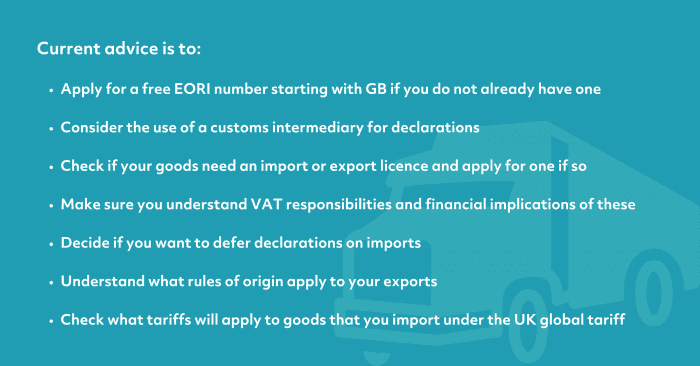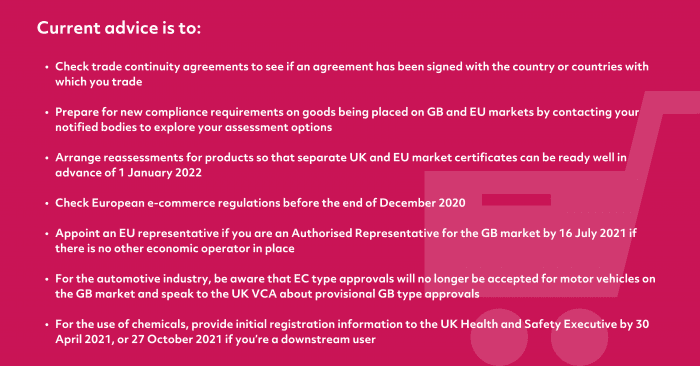Blog: Brexit: preparing for the changes we know about
Here’s a quick rundown of what we already know to help you cross-check how prepared you are for the 1st January 2021 EU withdrawal.
Moving goods
Imports and exports
When the transition period ends on 31 December the UK will operate a full, external border as a sovereign nation, and different controls will be placed on the movement of goods between Great Britain and the EU.
These new Customs formalities will be rolled out in three stages between January and July 2021. The staging sees full controls in place for exports and some controls in place on imports from January; full controls in place on animal and plant product imports from April; then full controls in place for all imported goods from July.
Global Tariff
Also from 1 January, a UK-specific tariff will apply to imported goods called the UK Global Tariff.
Rules of origin
When the transition period ends, exports from the UK will need to be classified as having UK origin rather than EU.
Although continuity of existing rules of origin have been secured with many EU partner countries, more new rules will come into play as we continue to engage with trade partners around the world.
What to do now

Gov.UK has some excellent videos about imports, exports, commodity codes, controlled goods and customs that we recommend you watch.
Trading with EU countries
Trading terms
The UK is seeking to sign trade continuity agreements to replicate existing EU agreements with as many countries as possible. Once signed, trade can continue with these countries under the same terms, however, agreements haven’t been signed with every country.
Where no agreement is in place, trade will take place under World Trade Agreement terms.
A list of agreements that have been signed and that are due to come into effect on 1 January 2021 can be found here.
Placing goods on the market
Compliance
To continue placing goods on the GB and/or EU markets from January a new approach may be needed depending on what regulations apply to your goods.
In particular, products currently regulated through CE certification, vehicles with EC type approvals, and chemicals with UK-held EU REACH registrations will need new or updated assessments and documentation.
Economic operators – including manufacturers, importers, distributors and authorised representatives – will have increased responsibilities in regard to ensuring products are compliant, so it’s important you understand what these regulations are for your goods.
What to do now

Employees from the EU
From 1 January 2021 free movement between the UK and Europe will end, and a points-based immigration system will apply.
It won’t apply to EU citizens living in the UK before 31 December 2020, who can apply to the EU Settlement Scheme before 30 June 2021, but EU citizens coming to the UK from January 2021 to live, work or study will need to apply under the new immigration system.
If you are looking to hire from outside of the UK, you’ll need to ensure you’re a Home Office licenced visa sponsor and the job you’re hiring for meets skill and salary levels as required by the new hiring system.
What to do now

While the messaging around Brexit is ever-changing and complicated, you can see that there are, at least, a few steps businesses can take to be prepared.
As the implications for financial areas like tax, accounting, and innovation funding become clear we’ll endeavor to provide you with the insight and advice you need to guide you through the upcoming months.
In the meantime, if you have any Brexit related questions you would like answering why not get in touch and we’ll see if we can help.

